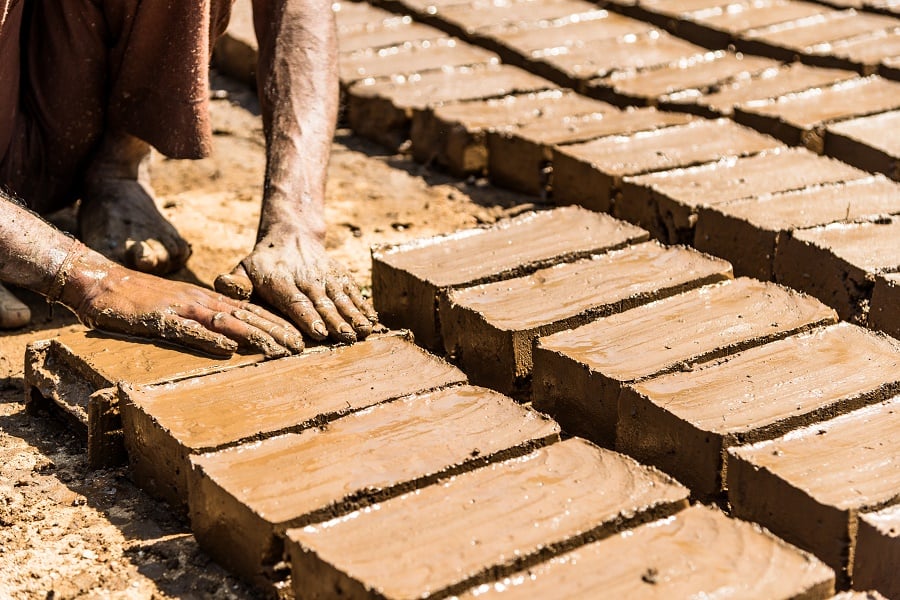In the slums of the central Indian city of Indore even the youngest children have to work.
Here Divine Word Missionaries are making it possible for these children to get their first steps in education through “bridge schools.” To assist older residents, microloans are available to help them start small businesses. Bridge schools and microloans will break young and old free of the cycle of poverty and liberate them from a lifetime of demeaning jobs and living in squalor.
When little Puja held out her small hands to welcome me, I was struck by the roughness of her skin. My own hands do not feel that rough even after a long, cold winter. This 9-year-old girl gained her dry, cracked hands through daily labor in the brickworks. Every morning Puja and her grandmother get up very early (she lives with her grandmother because both her parents are in poor health and unable to contribute to the family’s income). After a few quick bites of breakfast, the old woman and the girl set off for the brickworks at first light.
A day at the brickworks
What is poverty for Puja and her family? Work starts at about 4 a.m. in the morning. At first glance, making bricks looks a bit like baking. Metal forms are dusted on the inside with sand so that nothing sticks to them. Then, with bare hands, Puja and her grandmother fill the forms with the soft clay mixture already prepared by other workers. They pat it down, smooth it out and knock the form to loosen the moist mixture. Finally, they lift the form from the newly pressed brick. Then they move down the line to do it all over again. Puja and her grandmother repeat this process hundreds of times every single day. The bricks they have formed lay row after row to dry in the sun. Once the bricks dry, workers stack them into pyramids so that they can be fired.
Do not be fooled. This is not at all like playing in the sandbox. The work is hard and difficult. Sooner or later, squatting on the ground all day long over the brick forms will ruin a person’s posture. Together, Puja and her grandmother can turn out about 1,000 bricks a day, working 10 hours in sweltering heat. And what does that get them? Between the two of them, they manage to earn 500 rupees, equivalent to about $7.50, a day.
A foreman inspects the bricks they produce, and they are not paid for those that are cracked or chipped or otherwise fail to pass inspection. Father Roy Thomas SVD, who heads Janvikas Society on behalf of Divine Word Missionaries, brought us to meet little Puja. Together with about 30 of his co-workers and helpers in Janvikas — many of them social workers or teachers — Fr. Roy dedicates himself to helping the slum dwellers of the central Indian city of Indore. In recent decades, this city of 1.5 million inhabitants has become encircled by hundreds of shantytown slums where shabbily constructed apartment buildings overlook one-room houses made of mud that in turn are packed cheek to jowl alongside rickety shacks cobbled together from stray pieces of timber, metal sheeting, cardboard and canvas.
Settlements of tent dwellers have sprung up on small river islands and on plots of unused land. Indore has become a magnet drawing an unending stream of small subsistence farmers from outlying villages that can no longer eke out a living from their small patches of land. The lucky ones find work in construction. Many earn some money by hiring themselves out as day laborers. Some find work as servants for well-to-do families. Others collect and sort garbage, searching for recyclable material.
School among the slums
When I saw Puja for the first time, she was sitting with other children from 4 to 15 years of age on the floor of a crudely built brick house. Signs and posters hung on the walls displaying the alphabet as well as various kinds of flowers and fruits. This is the bridge school of the Himmat Nagar slum settlement. The “classroom” is actually the living space of a family who makes it available for lessons a few hours each day. The same kind of cooperation can be found in other slums where Janvikas operates bridge schools.
The day we visited the Himmat Nagar bridge school, the slum area was finally being connected to the public sewerage system. To enter the classroom, one had to jump over an open ditch dug for the sewage flowing through the neighborhood. Each day about 20 boys and girls gather here for lessons.
“The goal of our bridge schools is simply to give these children some basic knowledge. They learn their letters, counting, short rhymes and poems, and also a little English and some basic hygiene and health care,” says Fr. Roy.
For two or three hours a day, the girls and boys here are able to just be children — and learn.
“Intensive and difficult discussions with the parents are first necessary,” Fr. Roy adds. “It’s not always clear to them why they should give up the work and earning power of their children and allow them to attend school. But the people of the slums know us already. Parents here have learned to trust us. Our long-term goal, of course, is that each of these children will eventually have the chance to benefit from a primary school education in a normal school. The bridge school is the first step in that direction.”
In the bridge schools, the littlest ones sit in rows up front, cross-legged on the floor, with their small tablets in their laps. The bigger children sit toward the back. Puja is among them. Many of the children can attend the bridge school only part time because their families are utterly dependent on the children’s additional earnings. There’s no point talking about hobbies or fun. These children have no time to play. The bridge schools were created to help the youngest of Indore’s slum dwellers.
Microloans as a way out of poverty
Janvikas also has programs to provide economic aid to older residents trying to break free of the cycle of poverty.
“Janvikas has really changed my life,” says Avanti, a young woman about 25 years old (she does not know her exact age). “I could only get day labor in a chocolate packing factory because the company wanted to avoid having to pay the annoying social benefits that would be due me if I had full employment. From one day to the next I didn’t know whether I would be able to buy dinner for my six children.”
Now Avanti is the proud owner of a small grocery store. She obtained the capital to buy the store in the form of a microloan from the credit union run by Janvikas.
“What’s my biggest wish? To see my children in school,” Avanti says.
Mr. Sima can tell a similar story. Thanks to a microloan from Janvikas seven years ago, he has been running a small beauty shop that offers skin and hair care, makeup and help in the complicated process of draping saris for festive events. He is even able to share his success with others. Sixteen-year-old Shamila had searched in vain for a job. Now she works as a beautician in Mr. Sima’s salon.
“We want to help the slum dwellers achieve a regular income. Owning even a very small business can make a person feel independent,” explains Fr. Roy. Janvikas shows recipients of microloans how to keep books and helps them deal with the necessary and administrative and bureaucratic matters.
“We help the rubbish collectors by lobbying together with them in their struggle to obtain fair payment.” Fr. Ray says. “If families have a regular income, even though it may be small, they will manage somehow to find a way to send their children to school. These children have much better chances of finding a decent job and to avoid being sucked into undignified working conditions.”
And Puja? After her lessons in the bridge school, she quickly runs back to the brickyard to help her grandmother. They still have a long and busy afternoon ahead of them before she can run back home at dusk to take care of the family’s two goats, grab something to eat and get a short night’s sleep before beginning another busy day. We hope that someday Puja will also be able to say: “Janvikas really changed my life!”










